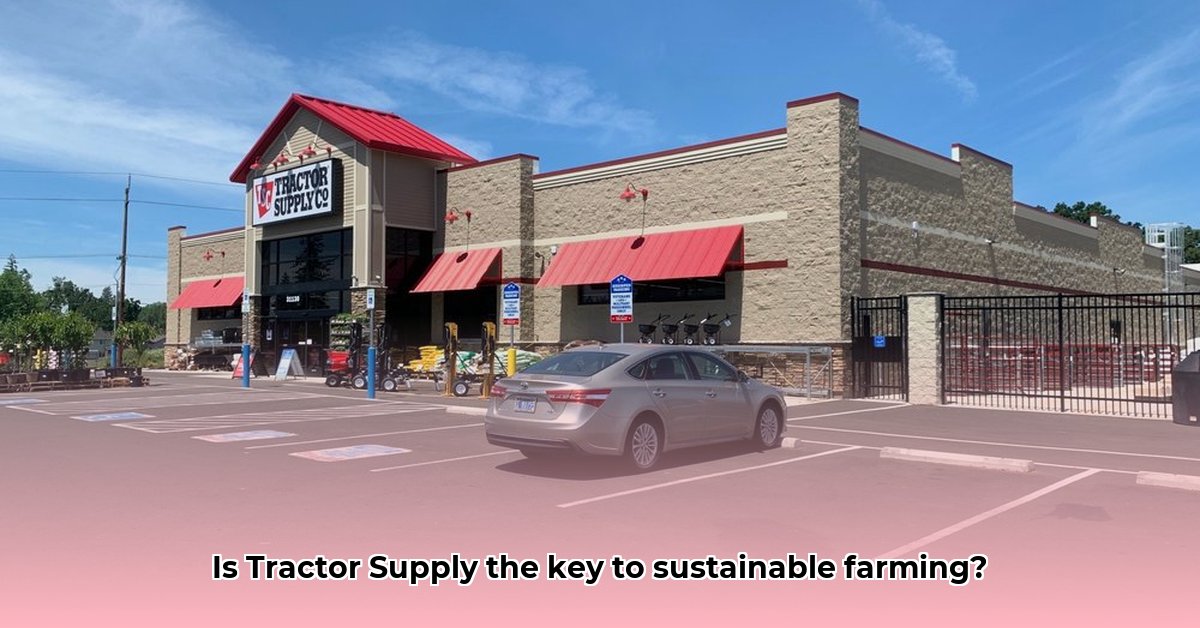
Molalla Tractor Supply, situated amidst Oregon's fertile farmland, presents a compelling case study: Can a national retailer significantly contribute to the growth of sustainable agriculture within a specific community? While its proximity to agricultural producers suggests potential, a closer examination reveals a critical lack of readily available data, hindering a definitive assessment. This article investigates this data gap and outlines a path forward for understanding Tractor Supply's true impact. For example, raised garden beds are a popular sustainable choice, as detailed on this helpful resource.
A Critical Data Deficit: Understanding the Limits of Our Knowledge
The primary challenge in evaluating Molalla Tractor Supply's contribution to sustainable farming is the absence of publicly accessible, granular data. We lack concrete information on the store's inventory of organic seeds, water-efficient irrigation systems, or soil amendments supporting sustainable practices. Without this information, any assessment remains speculative. This isn't a failure of the store, but rather a critical gap in the existing research. It underscores the need for more transparent data collection and reporting from retailers impacting agricultural communities. How can we accurately judge their sustainability efforts without knowing what products they are actually selling?
Investigating the Unknown: A Multi-Pronged Approach
To effectively assess Molalla Tractor Supply's role in promoting sustainable agriculture, a comprehensive investigation is necessary. This research must move beyond anecdotal evidence and incorporate multiple data collection methods. The following steps are crucial to obtaining a clearer picture:
On-site Observation and Inventory Analysis: A detailed on-site assessment is needed to document the range of products offered, with a specific focus on those supporting sustainable farming methods. This should include noting product placement and marketing materials.
Farmer Surveys and Interviews: Direct interviews with local farmers who utilize Molalla Tractor Supply are essential to understand their purchasing patterns and how the store's offerings impact their sustainable practices, or lack thereof. These interviews must be meticulously documented and analyzed.
Data Acquisition from Tractor Supply: Formal requests to Tractor Supply for data on sales figures, broken down by product category and emphasizing sustainable products, are essential. While gaining access to this level of granular data might be challenging, it's crucial for a comprehensive assessment.
Comparative Analysis: A comparative study of Molalla Tractor Supply's product offerings with other local agricultural retailers, both national and independent, will provide valuable context and benchmarks. This comparative data will highlight relative strengths and weaknesses.
Community Engagement Mapping: Researching Tractor Supply's participation in local agricultural events, educational initiatives, or partnerships relevant to sustainable practices will highlight their community engagement, if any.
The Larger Context: Connecting Local Impact to National Initiatives
While the focus is on Molalla Tractor Supply's local impact, it's critical to consider the broader context of Tractor Supply's national sustainability initiatives. For instance, their stated commitment to reducing carbon emissions and promoting biodiversity may not translate directly into tangible changes at the local level. Connecting corporate-level pledges to measurable on-the-ground outcomes in Molalla is a critical aspect of this investigation. Therefore, understanding the alignment (or lack thereof) between national strategies and local implementation is crucial.
A Call to Action: Steps for Progress
Addressing the data gap requires a collaborative effort from all stakeholders. The following steps outline actionable measures for different groups:
Tractor Supply: Proactively share detailed sales data categorized by product type; invest in community engagement programs aimed at promoting sustainable agricultural practices; conduct customer surveys to better understand demands.
Local Farmers: Actively participate in surveys and interviews to share their experiences and needs; advocate for sustainable products within the store; form alliances to collaborate with Tractor Supply on procurement and training.
Researchers and Journalists: Conduct thorough investigations using the methodologies outlined above, focusing on data collection and analysis to paint an accurate picture; publish findings transparently to fuel further discussion and action.
Consumers: Support retailers that actively promote sustainable agriculture products; demand transparency in product sourcing and environmental impact claims; engage directly with Tractor Supply, expressing the desire for clear and comprehensive information on their sustainable offerings.
By addressing this knowledge gap through rigorous investigation and collaboration, we can illuminate the crucial role that agricultural retailers play in shaping the future of sustainable farming within communities like Molalla. This is vital not only for environmental sustainability, but also for the long-term economic viability of local agriculture.